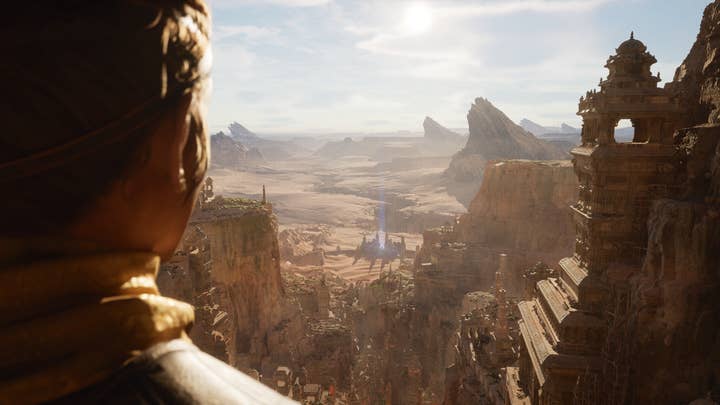Epic's next-gen bid to knock down the walled garden
Tim Sweeney, Kim Libreri, and Nick Penwarden discuss Unreal Engine 5, next-gen development, and Epic's efforts to make both open and accessible
For the last few years, Epic Games has been running with a recurring theme of throwing open floodgates across the different aspects of its business.
There's Fortnite, of course, with its massive, free platform that's become more of a virtual playground than a serious battle royale (though it's that too). Epic has invested unprecedented amounts into esports prize pools, tried to break the conventional revenue share model through its own PC storefront, brokered numerous exclusivity deals, and offered plenty of development grants.
And now, with the unveiling of Unreal Engine 5, Epic is bidding to be at the forefront of next-generation game development, while inviting as many developers to experiment with its technology as possible.
"For too long, games relied on static environments, not dynamic events, and everything felt a little bit pre-canned"
Kim Libreri
The Unreal Engine 5 was unveiled today in a demo running on the PlayStation 5, and many of its upgraded tools -- such as Lumen and Nanite -- are focused on maximizing the potential of next-gen hardware. Speaking with GamesIndustry.biz ahead of the reveal, CEO Tim Sweeney specifically praises Sony, saying that the PS5's graphic performance, storage system, high bandwidth and low latency are key factors in UE5 being able to overcome past limitations such as loading screens. The idea, Sweeney says, is that developers can build worlds that are so seamless players never notice that things are loading in the background at all.
Epic CTO Kim Libreri adds: "We felt that, for too long, games relied on static environments, not dynamic events, and everything felt a little bit pre-canned. So we started to think about what we think a next-gen game is going to be about. And it's fully destructible environments, fully editable environments, lighting that changes, time of day that changes, and details that look like a movie. This is the culmination of getting that all together in a tech demo that basically sets the ball rolling for all the amazing things we're gonna put into UE5."
Libreri also says that what we've seen from Unreal Engine 5 won't only benefit games that strive to look like movies. The same lighting and visual tools can be used for more stylized work as well, with Libreri comparing its capabilities to that of a detailed modern Pixar or DreamWorks movie.
Sweeney adds that its real-time illumination capabilities are also interesting, allowing for physics and environmental puzzles that change the appearances of environments to simply work, without developers having to fuss over things like lighting changes when, for instance, a cave ceiling crumbles inward. Libreri concludes that these effects can create more interesting gameplay, allowing for dynamic light highlighting key areas, setting the tone, or as part of a mechanic without requiring the conventional mechanisms of a classic video game flashlight.
"The limitations of technology are really only one of the industry's problems. The other is the limits of people's time and the economics of building games"
Tim Sweeney
Throughout our discussion, one key point that Sweeney, Libreri, and VP of engineering Nick Penwarden keep returning to is that Unreal Engine 5 isn't just about the capacity to make games that look, sound, and play better than ever before. It's about making those capabilities available to every developer, regardless of time, personnel, or budget constraints.
"We're trying to lay the foundation for a new generation of games," Sweeney says. "Unreal Engine 5 gets us far, far closer to photorealism than we've ever been before... But these are not just technologies for improving the visual quality of games. The other aim and perhaps even the bigger aim is to make content creators more productive, so that you can build next-generation games with a small team and produce incredibly high-quality results without a vast budget.
"The limitations of the technology are really only one of the game industry's problems. The other is the limits of people's time and the economics of building games, which is always a limiting factor for all game developers. And so really we're aiming to make strides in improving artists' productivity, so that you just don't have to worry about polygons anymore."
When asked for specifics on how Unreal Engine 5 and the new consoles would be able to cut workloads, Penwarden offers a few specific examples:
"In terms of developer workflow, probably the biggest part is that Nanite allows developers to import their high polygon assets directly into the engine," he says. "So previously, either you'd make this high poly model with tens, hundreds of millions of polygons. And then you'd have to go and make a highly optimized game version that has tens of thousands of polygons, and bake down normal map details to the low polygon model. With Nanite, you can import the high-resolution model directly, you get higher visual fidelity, and you also don't have to go through the additional steps of having to create all this additional highly optimized content.
"Maybe you can have a couple thousand objects in the frame at once. We have scenes in the demo that have more than a million objects"
Nick Penwarden
"Another area where this really helps is that Nanite enables developers to have effectively many more draw calls. So previously, developers are limited by the number of objects they can have in the scene -- maybe you can have a couple thousand objects in the frame at once. We have scenes in the demo that have more than a million objects, so as you're laying out and building your scene, you can just build it out organically... You don't have to go through this complex optimization pass of optimizing the scene to try to get under a draw call budget of a couple thousand miles."
Epic's announcement today wasn't just limited what games might look like in Unreal Engine 5 running on a PS5. In addition, the company announced it would waive all royalties on the first $1 million in revenue for all games made in Unreal Engine. Additionally, it's launching its Epic Online Services SDK, giving developers access to Epic's friends, matchmaking, lobbies, achievements, leaderboards, and accounts tools for free.
It's a move that tracks with past gestures by Epic Games across the other elements of its ecosystem, such as offering an 88/12 revenue split for games on its storefront, and its hefty monetary support of independent developers through PC exclusivity deals. Sweeney says that it's both beneficial to the company as a whole to make its services available to everyone in these ways, but that it's also part of a larger philosophy of unifying elements of the industry that he feels don't need to compete with one another.
"We want to work with all developers to build up a much bigger multi-platform gaming audience outside of a walled garden"
Tim Sweeney
"The core bargain here is that we want to work with all developers to build up a much bigger multi-platform gaming audience outside of a walled garden," he says. "Right now, you have Xbox Live and PSN and Nintendo Switch Online and Steam, each with a competitive user base with friend systems limited to that one platform. Here we're trying to connect all the platforms for all developers and have a shared user base.
"The Fortnite friend system is the core of that -- we have 350 million player accounts that have been used on 500 million devices, and there are 2.2 billion social connections on it. Now all developers can use that. And when another developer uses the system in their game, they contribute their users accounts and friend connections to the system and it grows to benefit everybody. It's very much in line with our open strategy of wanting to connect ecosystems instead of building bigger walls around them.
"Our aim is to enable our developers to have the capability of doing what we did with Fortnite without needing a huge team and without needing to make a huge investment. You have the ability to use all these online services to connect users across all the different platforms, to be able to not worry about whether your game can scale up to 12 million concurrent players. We lost a lot of sleep over that ourselves, and we did it so that you don't have to.

"What we get out of Epic Online Services is building up a persistent user base that transcends platform boundaries. The bargain is we give every developer access to the full Fortnite player base and social connections. Now, when people who play Fortnite come into their game they are immediately connected with all their friends. [Before], you had to rebuild a friend system for every multi-platform game that launches -- if you play Fortnite and Call of Duty and Rocket League, you've had to build up these systems.
"Epic's benefit is that we operate games. We have one of the biggest in the world, and we get more Fortnite friends as a result of it. We can also really help [lift] up the industry as a group of companies that cooperate together and collaborate together to reach users as opposed to fighting each other. The worst term that's ever been invented in the history of the internet is 'own the customer.'The customer owns themselves! I'm sorry; read the Magna Carta. Our aim is just to help all game developers do that in the way that we've done it with Fortnite."
"The metaverse is going to happen... I think the whole industry is going through this process of discovering what that new medium is going to be"
Tim Sweeney
That philosophy Sweeney lays out here extends beyond developer tools and Unreal Engine 5. There's been an ongoing conversation surrounding Fortnite over the past few years and its success not just as a game, but also as a social platform. Between that and Epic's broad reach across game development, publishing, a storefront, engine creation, developer tools, online ecosystems, and now this platform where celebrities are holding concerts and players are building their own creations, it seems in many ways that Epic is poised on the edge of its own metaverse of sorts.
Sweeney isn't denying that something like this is beginning to take shape. Right now, he says, Epic is still just trying to create the best tools it can on both ends of the spectrum: the powerful, complex Unreal Engine 5, and the simple, playful creative modes of Fortnite. But with time, he hopes Epic Games will build "more of a continuum in-between" the two spaces.
"There's a lot of work going on in these directions to converge the different ways of adding and managing content," he says. "And I think the metaverse is going to happen. There are a lot of different sci-fi analogs and predictions... I think the whole industry is going through this process of discovering what that new medium is going to be.
"It demonstrates that no one company in the whole industry is going to figure all this out on their own. It's going to take everybody working together and building on top of each other's efforts to really get to where we need to be, and I'm super happy to see that. Whatever form this medium ultimately takes, our biggest hope is that we can play a role in it, whether we're the creators of the big thing, or technology supplier to it, or even better, if it's a decentralized distributed system that combines everybody's efforts and connects them in a much more open way."



